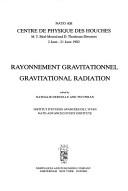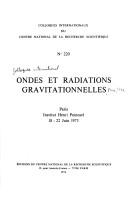| Listing 1 - 10 of 116 | << page >> |
Sort by
|
Book
Year: 1969 Publisher: Ann Arbor : University Microfilms,
Abstract | Keywords | Export | Availability | Bookmark
 Loading...
Loading...Choose an application
- Reference Manager
- EndNote
- RefWorks (Direct export to RefWorks)
Book
Year: 1981 Publisher: Ann Arbor : University Microfilms International (UMI),
Abstract | Keywords | Export | Availability | Bookmark
 Loading...
Loading...Choose an application
- Reference Manager
- EndNote
- RefWorks (Direct export to RefWorks)
Book
ISBN: 8773040401 9788773040409 Year: 1974 Publisher: København Munksgaard
Abstract | Keywords | Export | Availability | Bookmark
 Loading...
Loading...Choose an application
- Reference Manager
- EndNote
- RefWorks (Direct export to RefWorks)

ISBN: 0444865608 Year: 1983 Publisher: Amsterdam North-Holland
Abstract | Keywords | Export | Availability | Bookmark
 Loading...
Loading...Choose an application
- Reference Manager
- EndNote
- RefWorks (Direct export to RefWorks)
Book
ISBN: 019181718X 0191074470 Year: 2018 Publisher: Oxford : Oxford University Press,
Abstract | Keywords | Export | Availability | Bookmark
 Loading...
Loading...Choose an application
- Reference Manager
- EndNote
- RefWorks (Direct export to RefWorks)
The two volumes of 'Gravitational Waves' provide a comprehensive and detailed account of the physics of gravitational waves. Volume 2 discusses what can be learned from gravitational waves in astrophysics and in cosmology, by systematising a large body of theoretical developments that have taken place over the last decades.
Book
ISBN: 9813141751 9789813141759 Year: 2017 Publisher: New Jersey: World scientific,
Abstract | Keywords | Export | Availability | Bookmark
 Loading...
Loading...Choose an application
- Reference Manager
- EndNote
- RefWorks (Direct export to RefWorks)
"This book describes detection techniques used to search and analyse gravitational waves (GW). It covers the whole domain of GW detection, starting from the theory and ending with the experimental techniques (both present and future) used to detect them. The theoretical sections of the book address the theory of GW in the general relativity followed by the theory of GW detection. The different sources of GW are described as well as the methods used to analyse them and to extract the physical parameters of the sources. With the recent announcement of gravitational wave detection and the first results from LISA Pathfinder, this book will allow non-specialists to understand the present status of the field and the future of gravitational wave detection"--
Gravitational waves --- Gravitational waves --- Laser interferometers

ISBN: 2222016207 Year: 1974 Volume: 220 Publisher: Paris 7e : C.N.R.S.-Editions (Centre National de la Recherche Scientifique),
Abstract | Keywords | Export | Availability | Bookmark
 Loading...
Loading...Choose an application
- Reference Manager
- EndNote
- RefWorks (Direct export to RefWorks)
Book
ISBN: 1643680951 9781643680958 Year: 2020 Publisher: Amsterdam IOS Press
Abstract | Keywords | Export | Availability | Bookmark
 Loading...
Loading...Choose an application
- Reference Manager
- EndNote
- RefWorks (Direct export to RefWorks)
Book
Year: 2017 Publisher: Washington : U.S. Government Publishing Office,
Abstract | Keywords | Export | Availability | Bookmark
 Loading...
Loading...Choose an application
- Reference Manager
- EndNote
- RefWorks (Direct export to RefWorks)
Book
ISBN: 9781681737157 9781681737171 9781681737164 Year: 2020 Publisher: [San Rafael, CA] : Morgan & Claypool Publishers,
Abstract | Keywords | Export | Availability | Bookmark
 Loading...
Loading...Choose an application
- Reference Manager
- EndNote
- RefWorks (Direct export to RefWorks)
Gravitational wave (GW) research is one of the most rapidly developing subfields in experimental physics today. The theoretical underpinnings of this endeavor trace to the discussions of the "speed of gravity" in the 18th century, but the modern understanding of this phenomena was not realized until the middle of the 20th century. The minuteness of the gravitational force means that the effects associated with GWs are vanishingly small. To detect the GWs produced by the most enormously energetic sources in the universe, humans had to build devices capable of measuring the tiniest amounts of forces and displacements.This book delves into the exploration of the basics of the theory of GW, their generation, propagation, and detection by various methods. It does not delve into the depths of Einstein's General Relativity, but instead discusses successively closer approximations to the full theory. As a result, the book should be accessible to an ambitious undergraduate student majoring in physics or engineering. It could be read concurrently with standard junior-level textbooks in classical mechanics, and electromagnetic theory.
| Listing 1 - 10 of 116 | << page >> |
Sort by
|

 Search
Search Feedback
Feedback About UniCat
About UniCat  Help
Help News
News